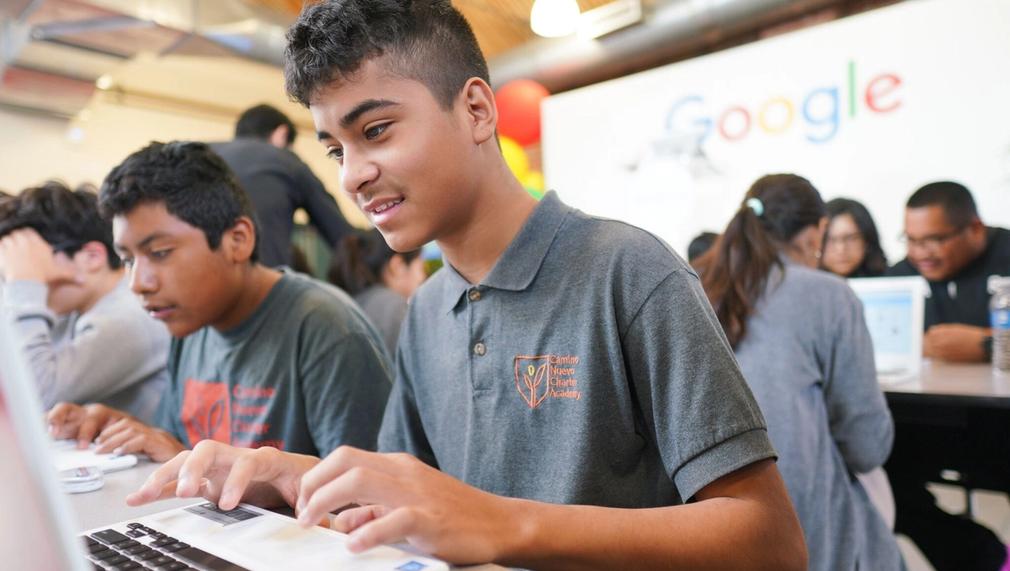Next Generation STEM Leaders in MacArthur Park
Despite a thriving tech field in Los Angeles, low-income students of color face barriers to entering STEM career pathways due to limited learning opportunities. By using culturally relevant project-based learning that fosters critical thinking, collaboration, and resilience, we will cultivate the next generation of STEM leaders. Our project formalizes a STEM pipeline from elementary through high school to expose our students early and often to hands-on learning opportunities and develop core technology, math, and science competencies.

In which areas of Los Angeles will you be directly working?
Central LA
In what stage of innovation is this project?
Expand existing program
What is the need you’re responding to?
Hispanic and Latino communities are sorely underrepresented in high-tech industries, making up only 7% of the nation’s STEM workers. When Latino students have an interest in STEM education, they often face barriers to getting consistent access to these opportunities, like underresourced schools, a lack of role models, or learning materials that don’t reflect their lived experiences or language. This problem hits home for our students: 96% of our students are eligible for free/reduced price meals and 95% are Latino. The current crisis has highlighted serious issues in technology access, further removing STEM as an accessible pathway. Equipping students with foundational 21st Century skills and core STEM competencies is critical for college and career success. By creating a K – 12 pipeline for students, we introduce technology and core STEM concepts early and often, while problem-based learning fuses community applications and a cultural lens to build the next generation of STEM leaders.
Why is this project important to the work of your organization?
We are uniquely suited for this work because of our experience with the population and the programming. We serve low-income students of color who can’t always access STEM opportunities or find role models from their communities. Our Director of STEM has over 10 years of teaching experience, plus an emphasis on project-based learning, and initiated a pilot of this project at three of our schools last year.
Last year, we focused on increasing math and science proficiency, raising proficiency by 10% across our network. We focus on STEM programming that highlights practical applications and invites interdisciplinary connections by teaching coding in Spanish, using project-based learning to provide tech solutions to real community problems, or linking discussions of identity and community to STEM lessons. By strengthening students’ autonomy, interest, and capacity to continue in science and math fields, our project strengthens engagement and breaks down barriers to STEM success.
Approximately how many people will be impacted by this proposal?
Direct Impact: 1,200
Indirect Impact: 2,068
Please describe the broader impact of your proposal.
STEM jobs are projected to grow 70% faster than others, highlighting a need for the next generation to develop 21st century skills and STEM competencies. Given current representation, we know that increasing opportunity for our students to enter this sector would be a major step towards inclusivity and economic security for low-income Latino students across LA. Our proposal helps build a model for project-based learning that can be applied to schools across the city serving similar populations. When schools offer standards-aligned STEM education that spans grade levels, invites multi-subject connections, and creates tangible skills, we can better prepare students to enter into the STEM sector – creating a stronger, more diverse Los Angeles.
Please explain how you will define and measure success for your project.
Our goal for this project is to increase students’ STEM proficiency and school engagement through expanded hands-on learning opportunities. When taken together, these also increase graduation and college matriculation rates by helping students learn to lead their own learning and opening up new postsecondary pathways.
We will grow Project Lead The Way (PLTW) from 3 schools to 5, creating a continuous and aligned STEM pipeline from K – 12th grade. PLTW adheres to California English and Math standards and national Next Generation Science Standards. Its interdisciplinary focus invites students to master multiple content areas as they work together to explore how technology can provide an innovative solution for a real problem affecting their community. Our implementation of PLTW infuses technology into the classroom and helps student cultivate essential STEM and soft skills, like critical thinking, communication, and cooperation, that prepare them for college and beyond.
To monitor progress toward our goal, we will track the numbers of teachers trained, students enrolled in PLTW courses, and PLTW courses offered. We will use student and staff feedback to measure satisfaction and enhance our program. Longer-term, we will look at gains in math and science proficiency for PLTW students at the end of the next school year through course grades or state test scores. We will also monitor high school graduation, college-ready graduation rates, and college matriculation rates.
Which of the LEARN metrics will your submission impact?
College matriculation
High school graduation rates
Proficiency in STEM
Which of LA2050’s resources will be of the most value to you?
Access to the LA2050 community
Host public events or gatherings
Communications support
Office space for meetings, events, or for staff
Capacity, including staff
Strategy assistance and implementation
Connection to STEM industry partners to increase student learning.